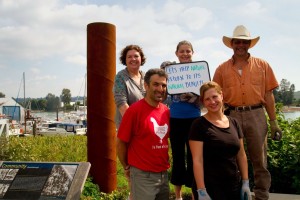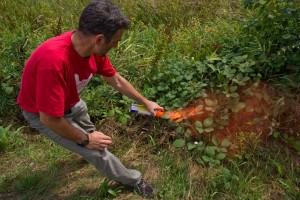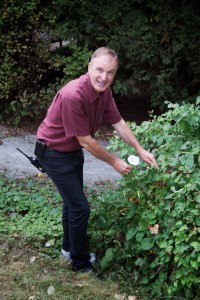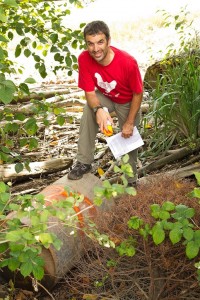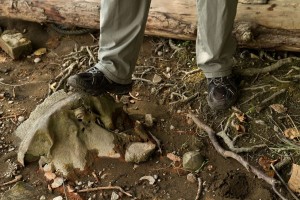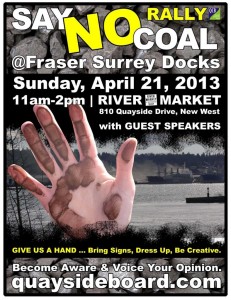Hi folks! Great to be back. August was killer, and many stories will be told, I’m sure. Now back to your regular programming.
I wasn’t sure what to write about at first, but look what the good people at one of the local CanWest Serious Newspapers of Record dropped on my lap – like manna dropped on the desert floor of my blog…
I stumbled across a pretty hilarious “op-ed” in the Vancouver Sun yesterday. I thought maybe it was clever satire in the Colbert Report style, but when I saw the byline and noted the affiliation with Patrick Moore and his Greenwashing Cabal, I realized the writer was trying to be serious. This is and example of why I stopped lamenting the demise of dead-tree news, if this is the best they have to offer. At least the Province has a decent Sports Section.
The opinion (if I can paraphrase) is that mining and export of coal is good, right, and ethically the best thing we can do, because without us supplying them coal, the developing world is doomed to eternal poverty and we will be able to get fewer gadgets from China; climate change be damned.
However, there are deeper issues with the opinions stated, which I would like to address individually:
“First, despite the current trend away from coal to cheap gas, China and other developing countries will need coal for the foreseeable future. The morality of denying them access to it is questionable. For hundreds of millions in China and elsewhere, consuming coal for electricity and heat is not a choice.”
This is sort of true, except that it isn’t. Burning coal for electricity and heat is every bit a choice for emerging economies as it is for us in British Columbia. Just like us, it is an economic choice, made for economic reasons by economic satisficers. In British Columbia, we have decided, despite our ample coal resources, to not burn coal to generate electricity or heat, because of the negative consequences to our communities, and instead generate electricity by (in descending importance) through hydroelectricity, by burning oil and gas, wood waste, garbage, and other alternatives. Cost may or may not have been the primary driver for BC making that choice, but it was no doubt a choice we made for economic reasons. Other countries have made different choices, based on their local economic situation, but it is a choice.
“Removing North American coal supplies from the market will not reduce consumption, but will likely increase prices.”
Notice how Patrick Moore’s young apprentice has mastered the self-contradictory argument skills of his master. If we fail to provide a cheap route to get coal to market, or otherwise restrict supply, coals prices will indeed increase, if one believes in supply and demand economics. Of course, the other half of supply and demand is that if the prices go up, demand will drop, as the alternatives to coal become more economically attractive. This will, no doubt result in reduced consumption. You can’t have one without the other, as coal is a commodity with negative elasticity.
“It will also encourage coal mining in less safe jurisdictions. Is it right for us to impose such hardships on our fellow human beings while presenting no current practical alternatives?”
The thinking gets yet sketchier here. If we don’t supply coal, then the increased value of coal may, indeed, increase coal mining in other jurisdictions, some of them being “less safe” than ours. However, compare this discussion of “imposing hardships” on others by encouraging resource extraction with the rest of this op-ed (where resource extraction is seen as the ticket to prosperity by driving economic development and innovation), to find deeper self-contradiction:
“One way some pundits make such imprudence look clever is to style natural resource wealth as a handicap, as if knowledge-based sectors falter when resource extraction thrives. But this is a false argument because the extractive sectors are knowledge-based and already rich with intellectual capital. Just ask any geologist, engineer, or GIS software designer. Resource wealth drives innovation, not the opposite.”
So resource extraction is good for every aspect of our economy- but we would not want to “impose that hardship” on developing nations where it might be “less safe”, would we? Which is it Grasshopper?
“Another inconvenient reality is that poverty in the developing world will worsen if we manipulate energy supplies. Industrialization reduces poverty by releasing agrarian families from mere subsistence. It creates higher paying jobs, enabling increased education for children and autonomy for women. Over the long term, this results in a more affluent, service- and knowledge-based economy. The energy driving this gradual process is coal. Blocking North American coal supplies to Asia risks driving up the cost of living for the world’s poor.”
This is an excellent example of the Bifurcation Fallacy– or more colloquially, a False Dichotomy, very popular with Dr. Moore’s writing. The writer here is suggesting that without coal, the developing world cannot possibly achieve autonomy for women or any of the other benchmarks of development. Clearly this is bullshit. There are many paths to prosperity and higher levels of development, and there are many ways a developing nation can fulfill its energy needs. The corollary argument also does not work, as ample supplies of cheap energy hardly guarantees egalitarian societies. Saudi Arabia anyone?
Also, let’s get over this illusion that the world’s poorest people rely on coal. The world’s 2.5 Billion poorest people have no access to coal at all, but instead burn wood or dung as their one and only fuel source. China (the oft-repeated example here) produces 47% of the world’s coal, but burns 47% of the world’s coal. China is not a net coal importer – any coal it does import or export is for economic trade reasons, not for the benefit of supplying energy to its poorest citizens. If you list the 10 countries that consume the most coal in the world you end up with this:
Country Tonnes % Member GDP rank
China 3,826,869 47% G20 2
USA 1,003,066 12% G8 1
India 721,419 9% G20 9
Russia 256,691 3% G8 10
Germany 256,661 3% G8 4
South Africa 201,403 2% G20 28
Japan 192,854 2% G8 3
Poland 152,988 2% 24
Korea, South 139,481 2% G20 15
Australia 131,174 2% G20 12
So 85% of the world’s coal is consumed in only 10 countries, 4 of them in the G8 (the 8 largest economies in the world), and all the rest but Poland are in the G20. All of them are in the top 28 largest economies in the world. If you take the coal burned by the 20 member countries in the G20, the other 180+ countries in the world are left with only 11% of the coal. The vast majority of coal is being burned by the relatively well-off in developed economies, not by the poor in the Third World.
Giving the poorest nations a lump of coal is much more Grinch-like than Santa-like.
“Yes, the negative environmental, health and safety impacts of coal mining and use are significant. Poor countries are not oblivious to coal’s negative impact, but they need it at present to better the standard of living for their citizens. Why not provide these countries with North American coal that’s mined according to tough environmental and safety guidelines, creating well-paying jobs and prosperous communities on this side of the Pacific?”
Am I the only one confused by this line of reasoning? It seems to suggest we are actually helping out the poor by facilitating the introduction of negative health, environmental and safety impacts on them, while we get the well-paying jobs and prosperous communities? How does a person in India benefit from Canada’s “tough environmental and safety regulations” when a coal-fired power plant next to his house in Calcutta has no such regulations?
“And why not encourage them to use the latest coal burning and scrubber technologies to reduce air pollutants?”
Ahhh… the simple solution. Of course. Except it is untenable and contradictory to the rest of the argument. How do we “encourage” another country to install expensive scrubbing technologies? I thought this article was arguing that coal was used by poorer countries because it is affordable and they are so teetering on the edge of energy collapse that if we make it any less affordable by lowering the supply, the poor will go without energy and suffer. Now the article suggests if the poor would just get their act together and spend some money scrubbing their dirty coal, it will be just fine. His might be the paragraph that best straddles the line from ignorance to parody.
Note: you really can’t “scrub” the greenhouse gasses out of coal emissions, but I digress.
“The problem with public discourse on coal is that simplistic answers are preferred over holistic, well-reasoned and defensible solutions. Coal adds to global warming and therefore we should ban it, they say. But the truth is we can’t ban coal. Australia will be more than happy to rake in the billions we will be leaving on the table for them.”
Here we have another common Logical Fallacy known as the “Strawman”. Make a hopelessly weak version of the opposing view, then have fun flogging that weak position.
The arguments against the expansion of coal exports through BC ports are not simplistic, but remarkably complex and multi-faceted. Some raise concerns regarding the health impacts of coal dust moving through our communities, some are concerned about the implications of moving bulk coal through our sensitive ecosystems, some argue that it is unethical to mine and export a product that is simply too dirty and unsafe for us to burn domestically – If coal is too dirty for BC to burn for energy (as our Provincial Government has codified in law), why are we OK with profiteering from its use elsewhere? Others argue that the mining and export of coal without accounting for the carbon impacts violates the spirit of, if not the letter of, the Provincial Greenhouse Gas Emission laws.
Holistically speaking, coal is a disaster for the planet. It was a pollution disaster in London in the 19th Century, an acid rain disaster for the Great Lakes in the 20th Century, and is a public health disaster for China in the 21st Century. If we don’t figure out alternatives, or find some magic bullet to sequester the resulting carbon dioxide, it will continue to contribute to a Climate Change disaster in the 22nd Century.
The answer to mitigating this disaster- moving on to a post-coal economy, is not at all simplistic, nor is anyone suggesting it is simplistic It is complex and will create hardship for people in coal towns, and for aspects of the economy that rely on coal extraction and burning. But it must happen, so we need to figure out how to get there with the least possible human impact.
What is simplistic is the argument that coal is great for our economy, and if we don’t sell it, Australia will get all of our money, so Damn the Torpedoes! There are lots of things that are potentially “good for the economy” that we choose not to do – from exporting asbestos to engaging in the trade of slaves to killing sperm whales for ambergris. All were perfectly legal in the past, but the world (with notable exceptions) has moved on, as social and economic pressure was applied to those few countries that still engaged in the activities. Some of that starts with small, symbolic acts, like those taking place up and down the west coast of North America, where communities from California to British Columbia are deciding that the local and international cost of coal extraction and burning is such that they no longer want to draw their income that way.
I am glad the author made a passing reference to greenhouse gases in his Op-Ed, like it is one of those little accessory issues, and not the centre of the entire argument about promoting reliance on coal on other nations. Not mentioned is the (ahem) inconvenient fact that it is the very poor in underdeveloped nations who will suffer the most from the impacts of Climate Change. Suggesting that burning more coal will help the world’s poor is wrong; to suggest we should have some sort of economic battle with Australia to see who can sell the most coal to the world’s poor is unethical in a deep way.
“Coal is not just a much-loathed rock we can toss aside; it’s part of the fabric of our human existence. We have a complex relationship with coal built over millennia.”
Replace the word “coal” with “cancer” in that paragraph: it makes the paragraph no less true, and no less relevant.
“We can’t rashly break it off over night.”
No, but we can begin to transition our economy away from coal, and there is no need to be rash about it. Limiting our exports to current levels as opposed to unlimited expansion, is hardly rash, and what people that the author disparages are currently suggesting. Putting a moratorium on expansion of new coal mining in British Columbia until the science catches up to dealing with the environmental impacts would also be a good step. Alternately, let’s start to include the true carbon footprint of coal in the accounting of how we mine and sell it, and apply the carbon tax to this industry to remove their competitive advantage over other job-creating industries in the Province that currently pay a Carbon Tax.
Perhaps if the true cost of coal is accounted, we will discover its reputation as “cheap energy” will be proven false, and our strange love affair with it will end. Like often happens when a relationship isn’t doing us much good, our friends are often afraid to have a serious talk to us about how we are hurting ourselves and the people around us. It’s time to sit down with coal and have a serious talk.
